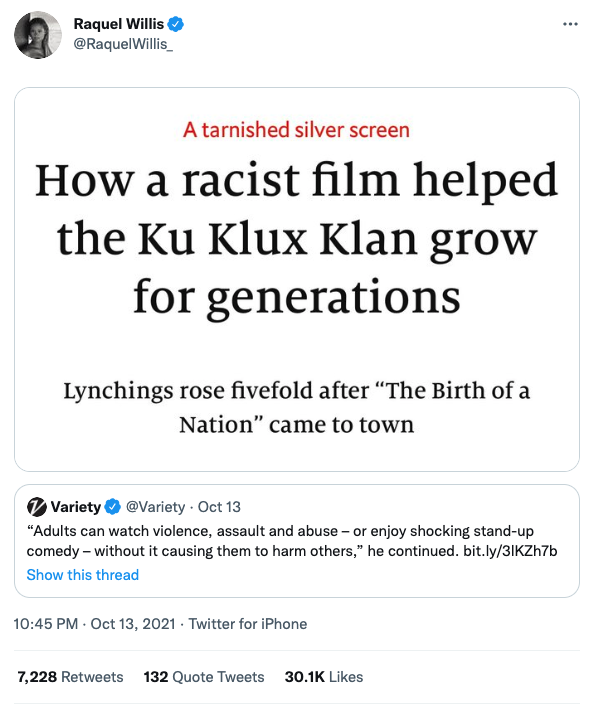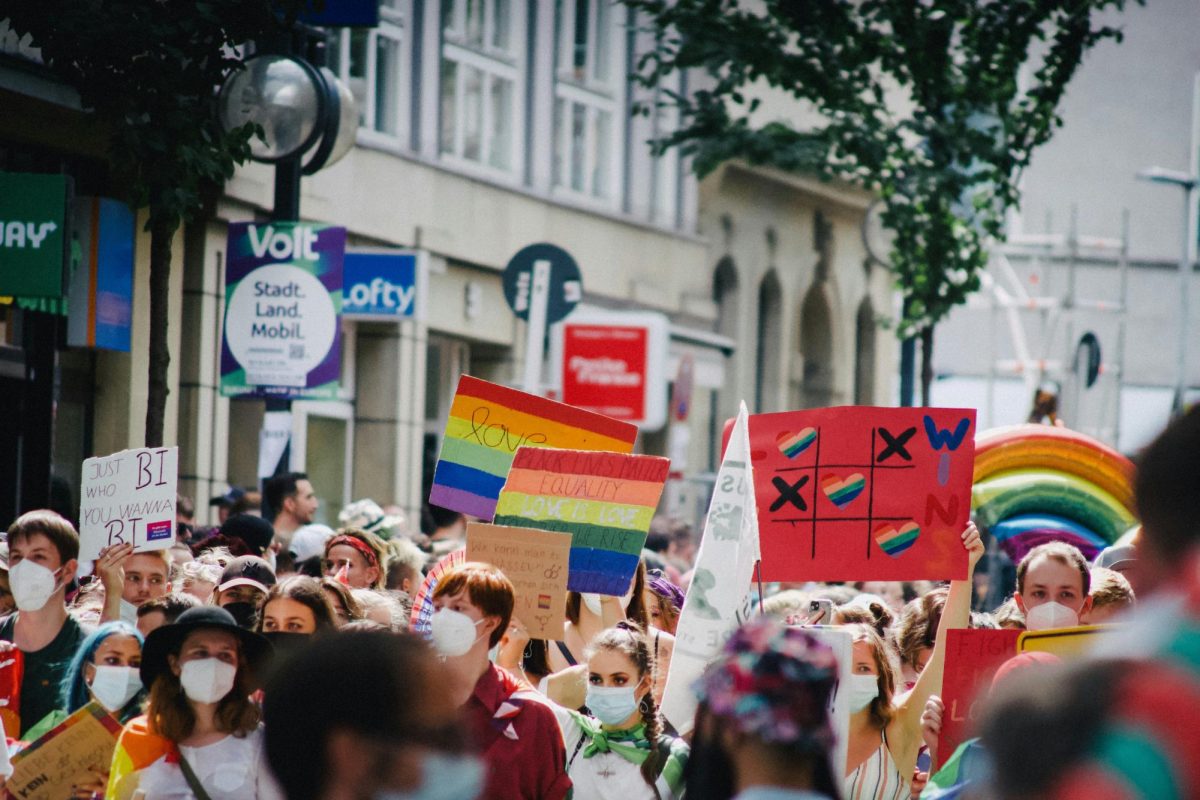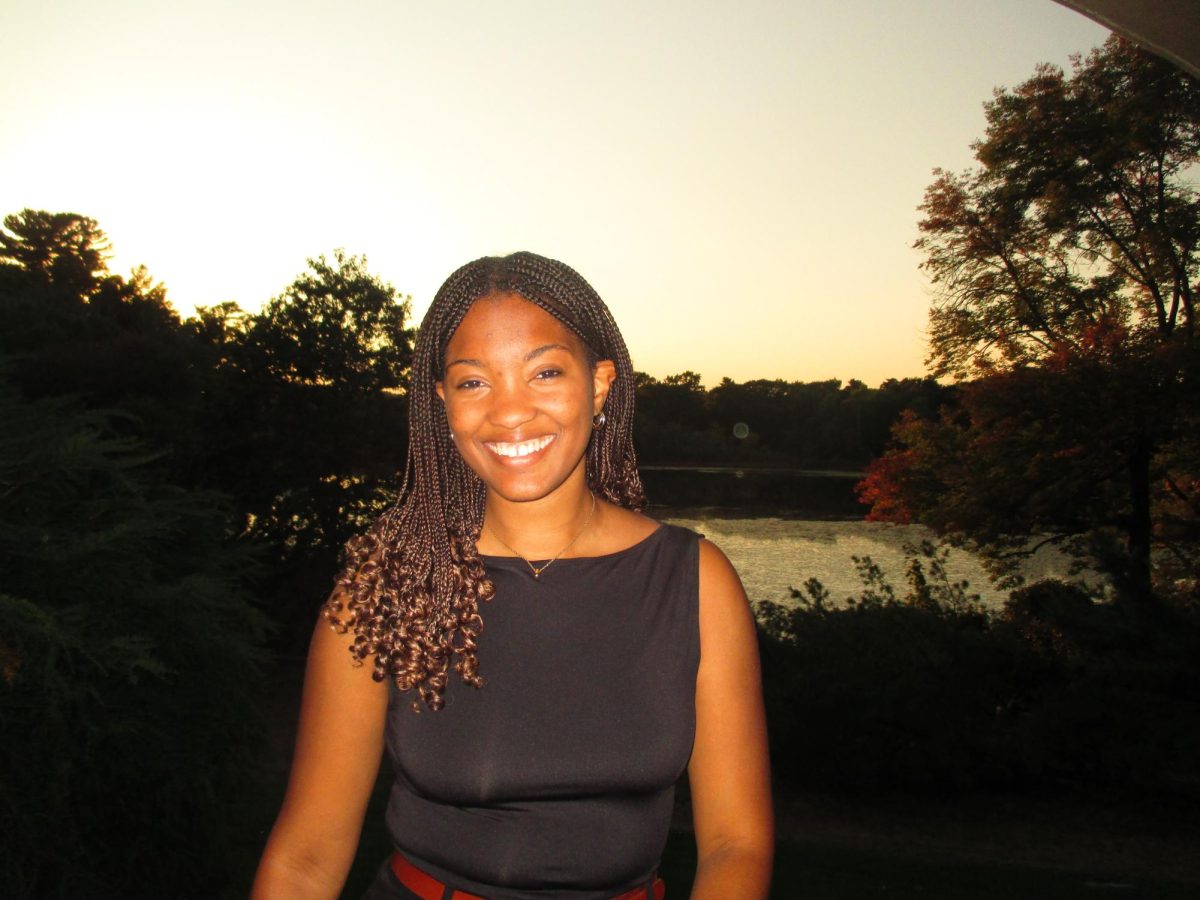CW: mentions of transphobia and homophobia
“The Closer,” Dave Chappelle’s latest Netflix special, was released on Oct. 5, 2021. (Full disclosure: I have not watched “The Closer,” and do not want to support Chappelle, but I have gathered comments and quotes from reviews). Chappelle is known for his provocative and racially charged comedy and commentary, but has been criticized in the past for his targeting of transgender people in his comedy. In his newest special, he makes this the focus. Chappelle claims that “gender is a fact,” and declares himself a TERF (Trans-Exclusionary Radical Feminist).
The special was widely criticized by users on social media and organizations like GLAAD, the LGBTQ+ advocacy group, who wrote in a tweet, “Dave Chappelle’s brand has become synonymous with ridiculing trans people and other marginalized communities.”
Chappelle responded to the controversy by saying, “If this is what being canceled is like, I love it.”
I am not Black, nor do I identify as LGTBQ+, so there are many others who can speak to the nuances of the harm caused by Chappelle’s comments. There were many Black and/or LGBTQ+ people who were criticizing Chappelle’s special, and who pointed to the tragically growing list of the names of the 41 transgender people who were killed in 2021. A majority of them were Black and Latinx.
On Oct. 11, 2021, Netflix’s Co-CEO Ted Sarandos sent an internal memo to Netflix employees defending the special and Dave Chappelle. He wrote, “While some employees disagree, we have a strong belief that content on screen doesn’t directly translate to real-world harm.” He used the example of the rise in violent video games (this was where it really went off the deep end), and “yet violent crime has fallen significantly in many countries.” As a matter of fact, there is proof of how content can cause “real-world harm,” namely the film “Birth of a Nation,” which caused a resurgence of the KKK.
But, he also pointed out that “we are working hard to ensure marginalized communities aren’t defined by a single story. So we have Sex Education, Orange is the New Black, Control Z, Hannah Gadsby and Dave Chappelle all on Netflix.” Hannah Gadsby responded on Instagram, saying, “[Don’t] drag my name into your mess.”
In another memo, he also pointed out that Chappelle’s previous stand-up, “Sticks and Stones,” was Netflix’s most popular and award-winning standup on Netflix, as if that was justification for supporting Chappelle’s comments. He also touted “Disclosure,” a documentary on Netflix (but not made by Netflix) about how Hollywood’s portrayal has impacted transgender people (the cognitive dissonance here is truly astounding).
As you can probably tell, there are significant leaps in logic made here, one of which is comparing violence and abuse portrayed on screen to stand-up comedy, but what really intrigued me was how he pointed to some of Netflix’s original shows and movies that were hailed for their representation of the LGBTQ+ community. Evidently, he understood that they were important, but seemed to forget it was because they were a refreshing change of pace from the stereotypical way that the LGBTQ+ community was portrayed in, yes, “content on screen.”
If content does not translate to real-world harm, then it should not translate to real-world change either. But Sarandos did not seem to consider that.
As your resident writer about representation, you probably know I was incensed by this statement. I was truly enraged by how insensitive it was, especially to marginalized communities. What we see on screen defines the limits of what we imagine, for ourselves and for the world. It matters what we see, because it shows us our potential.
This is true for the flip side too. If every time you see yourself on screen is an oppressed woman struggling against her religion and her hijab, or a terrorist shouting “Allah-u-Akbar” (God is the Greatest), the phrase you recite in prayers every day, before everything explodes, then you believe your potential is extremely limited. You start to question yourself and what you know about your religion. You get questions about your religion, far more than anyone else, as if you are some theological expert.
I was in middle school. And that was just the beginning.
But we know why representation matters, and what it can do when it is done right. But that representation you may see on screen in, perhaps, a Netflix show or movie, will not ring as true when the platform disregards its impact entirely.
Sarandos did walk back his initial statement on Oct. 20, 2021 (although I am still bitter), and said that he should have “led with humanity” first. However, he still did not believe a content warning would be appropriate, as there was already an age restriction on the content itself.
Netflix employees organized a walkout in protest of Netflix giving a platform to Chappelle’s special, which occurred on Oct. 21, 2021. B. Pagels-Minor, a Black trans employee who helped organize the walkout, was fired, allegedly because they were the source of leaked information to the media. Three other employees were also suspended, allegedly because they crashed a virtual business meeting with top executives. The employees who walked out also wrote a list of demands, none of which were actually to remove the special from Netflix altogether. They did ask for a content warning to be placed before the special began, so as to ensure no viewers would be blindsided by the content itself.
Streaming services were supposed to be the equalizing forces in terms of diversity in entertainment. A study from Nielsen, the ratings company, of the on-screen demographics of the 100 most popular shows across cable and streaming, concluded that across broadcast, cable and streaming, white, non-Hispanic actors made up 81.2% of all recurring characters. In contrast, streaming ranked highest or second-highest in shows starring people of color, as well as the highest rate of representation for recurring women characters and LGBTQ+ characters.
This is the same progress Sarandos touted, but used to justify keeping the special online without any content warnings or edits. This diverse content is profitable too, and companies are aware of this.
But they give platforms to this content for profit, not necessarily for advancing marginalized communities in entertainment, because now people are consuming diverse content. They are moving towards where their audience is and are bringing them more watchers.
Netflix is not the only platform culpable for such hypocritical actions, as Spotify also came under fire for touting their diversity and not practicing what they preached. In the wake of the Black Lives Matter protests in June last year, Spotify had multiple playlists dedicated to Black artists. Morgan Wallen, a rising country star, was caught on video using a racial slur which went viral on Feb. 2, 2021, and was widely condemned by fellow musicians and artists. He was also removed from Spotify’s promoted playlists, only to be back on those playlists a few days later. Spotify also has a dedicated category to the Joe Rogan Experience, the podcast hosted by Joe Rogan, who once suggested that young people do not need to get vaccinated.
These corporations can tout their diversity and the content on their platform, but ultimately it is for profit, and they will give platforms to whomever will get them the most fame and money.
I don’t know what the best solution to this is. I must admit, I am a Spotify addict, I literally cannot survive without music. I didn’t watch Netflix on the day of the walkout, but I did after that.
But the first step would be to really understand what is behind all these proclamations of their commitment to diversity and inclusion before we hail their efforts towards increasing representation for us.
Are they really committed to making the world more inclusive? Or is it just because it gets them a bigger check?




